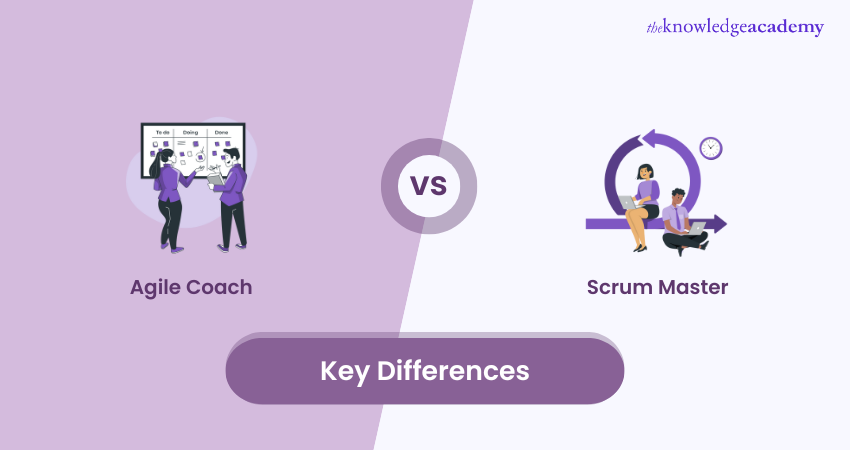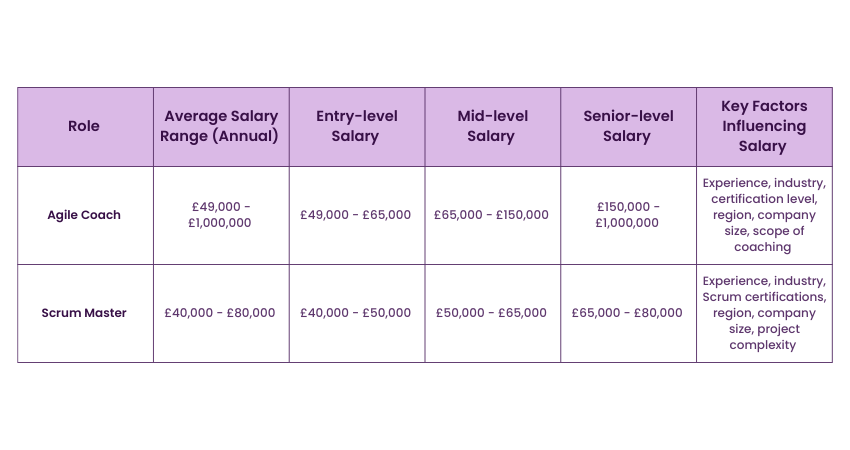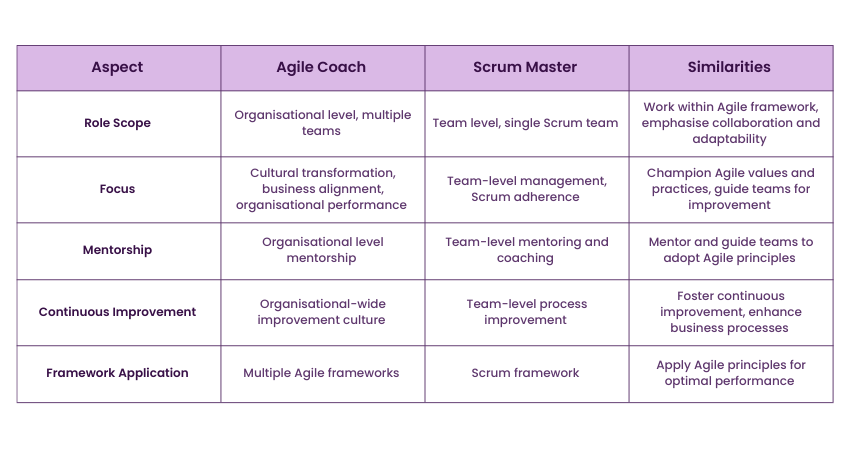We may not have the course you’re looking for. If you enquire or give us a call on +33 805638382 and speak to our training experts, we may still be able to help with your training requirements.
We ensure quality, budget-alignment, and timely delivery by our expert instructors.

The shift to Agile is vital for any organisation, yet the roles of Scrum Master and Agile Coach often get mixed up. The debate—Agile Coach vs. Scrum Master, which is better?—misses the point! They’re distinct roles with different paychecks, from £57,000 for a Scrum Master to £1,000,000 for an Agile Coach, as per Glassdoor.
Want to know what sets them apart? Dive into this blog to explore their key differences and unique contributions. Let's embark on this enthralling chapter!
Table of Contents
1) Scrum Master vs Agile Coach: Roles and Responsibilities
2) Scrum Master vs Agile Coach: The Key Differences
3) Scrum Master vs Agile Coach: The Key Similarities
4) Required Qualifications for the Roles
5) Key Skills Differentiating Scrum Master and Agile Coach
6) Choosing Between an Agile Coach and Scrum Master
7) Conclusion
Scrum Master vs Agile Coach: Roles and Responsibilities
In a project management scenario, organizations may wonder whether an Agile Coach or a Scrum Master taking Scrum Master Mistakes into account would be better suited for overseeing the development process. There are various instances and stages during the Project Management Cycle when their tasks may look similar.
A closer examination of the technical aspects of a project reveals that each role has its own unique contributions. Let’s dive deeper and explore the distinct tasks performed by Scrum Masters and Agile Coaches:
Roles and responsibilities of an Agile Coach
An Agile Coach deploys Agile practices among teams to develop an effective, transparent, and cohesive environment. But their role doesn’t stop there. There are various other responsibilities that they need to fulfil, which include:
a) Training teams to implement Agile tools and methods in an effective manner.
b) Educating Agile Teams as well as individual employees about their strengths and weaknesses to instil an Agile mindset.
c) Developing governance methodologies to support Agile-based tasks.
d) Training stakeholders and encouraging leadership to participate actively in the development process.
e) Evaluating, recommending and adopting transformation in Frameworks of Agile methodology.
f) Observing the team’s performance and providing solutions.
g) Developing company policies to support Agile approaches.
h) Empowering teams to come up with high-value increments within the timeline.
Unlock your potential and drive your career forward with our SAFe Agile Certification!
Roles and responsibilities of a Scrum Master
Can we talk about project management without mentioning the Scrum Master? Scrum Master is an indispensable part of Agile. Let’s briefly explore the
a) Educating and mentoring teams on Agile methodologies.
b) Facilitating Scrum meetings to get daily updates on processes and remove roadblocks.
c) Assisting the Product Owner with managing the product backlog.
d) Ensuring the team follows Scrum principles and rules.
e) Assisting team with tasks such as Sprint Planning and Backlog Management.
f) Encouraging the team to develop an Agile mindset to improve and meet objectives continuously.
Agile Project Management Foundation & Practitioner – Your Gateway to Proactive Project Excellence.
Scrum Master vs Agile Coach: The key differences?
Notably, the core difference between an Agile Coach and a Scrum Master Resume is that an Agile Coach mentors and assists both Agile teams and project stakeholders in effectively implementing Agile methodologies. On the other hand, a Scrum Master’s role is limited to educating and managing teams engaged in Agile.
Beyond this, there are several other key aspects that distinguish an Agile Coach from a Scrum Master. Looking for a detailed breakdown of their roles? Here are the key differences to help you decide which one is right for your needs:

Key areas of focus
An Agile Coach focuses on achieving organisational goals and collaborates with various teams to offer insights and expertise. Their primary tasks involve the following:
a) Leading the Team: Aligning all Agile teams and fostering a healthy environment among team members to better understand organisational goals and make effective decisions.
b) Product Development: Helping teams recognise the strengths and weaknesses of the product while providing opportunities for improved product design.
c) Management: Building relationships, cultivating a responsible culture, and facilitating organisational behavioural changes. Scrum Master’s key tasks include managing a single team and mentoring them to streamline their Scrum workflow. Their key focus areas can be as follows:
a) Mentor: Educating individuals, teams, and organisations to adopt the mindset and behaviour needed to leverage Scrum methodology effectively. It also means resolving conflicts and improving the team’s abilities.
b) Collaborate: Collaborating with the organisation’s executives to understand client requirements and priority tasks to provide high-quality products. Thus adding value to the business processes.
Knowledge Domains
An Agile Coach works with all teams and stakeholders while ensuring that various Agile frameworks are applied effectively. They must be well-versed in all Agile frameworks. This includes understanding the strengths and weaknesses of each framework, selecting the correct framework for a particular project, and adapting strategies according to the project’s needs. Additionally, they should be mindful of key differences, such as those between Scrum and SAFe.
In contrast, a Scrum Master’s expertise lies in being thoroughly familiar with the Scrum framework. As a key member of the Agile team, a Scrum Master specialises in Scrum and manages Scrum artefacts for product development. Therefore, it is the Scrum Master’s responsibility to ensure the team understands the Scrum framework, is empowered to eliminate bottlenecks, and adheres to its rules and guidelines.
Time Period
While an Agile Coach remains involved throughout the project lifecycle, a Scrum Master typically operates between sprints. The former ensures that the project’s end goal is met, while the latter exits once a sprint’s objectives are achieved.
Level of Experience
An Agile Coach requires at least 1,000 hours of experience as an Agile team member, along with experience as a Scrum Master. They must also demonstrate participation in Agile projects.
Conversely, a Scrum Master generally needs a bachelor’s degree or high school diploma in IT, Business Administration, or a related field, along with a proper training certification from an accredited institute.
Note: The above requirements are for entry-level job profiles.
Furthermore, a Scrum Master can evolve into an Agile Coach over time. This transformation is a gradual process requiring significant experience. Apart from working experience, Scaled Agile Framework (SAFe) training and certification are also required, along with the necessary skills.
Additionally, essential skills such as communication, leadership, and mentoring are crucial. Typically, five years of experience as a Scrum Master is needed to smoothly transition into an Agile Coach role.
Agile Coach vs Scrum Master: Salary Comparison
An Agile Coach can earn between £49,000 and £1,000,000 annually, whereas a Scrum Master’s salary typically ranges between £40,000 and £80,000 per year.
This is the basic overview of salaries for both job profiles. However, the salary may differ according to the region, industry and company. Check out the detailed salary comparison between Agile Coach and Scrum Master below:

Learn about common Scrum based terminologies with our Scrum Overview Course!
Scrum Master vs Agile Coach: The Key Similarities
Although their roles are distinct, both share similarities within the Agile framework. Both champion the principles of Agile methodology, emphasising collaboration, adaptability, and iterative progress. The Agile Coach and Scrum Master serve as mentors, guiding teams toward embracing Agile values and practices.
Moreover, they both foster a culture of continuous improvement in an organisation. Both roles also foster a culture of continuous improvement, encouraging teams to reflect on business processes and enhance efficiency over time.
Now, the Scrum Master operates within a specific framework, referred to as Scrum, and focuses on ensuring the team adheres to its principles. They facilitate ceremonies, remove impediments, and shield the team from external distractions.
On the other hand, an Agile Coach operates at a broader organisational level, extending beyond a specific framework. They may work with multiple teams, departments, or even the entire organisation. Agile Coaches focus on cultural transformation, aligning business objectives with Agile practices, and optimising overall organisational performance.

Required Qualifications for the Roles
An Agile Coach and Scrum Master possess different qualification. Let us have a look at their qualifications in detail:
Scrum Master Qualifications
First and foremost, a certificate showing your credibility and knowledge of Scrum gives you an advantage over the others and possible career options for a bright future Certification gives an idea that you have at least a standardised understanding of the role of a Scrum Master.
Pursuing a certification also means attending seminars and workshops that can increase your experience and insights into various topics. It can open many communication channels to communicate with people in similar fields.
Typically, Project Managers, Software Developers, Product Owners, Business Analysts, IT Managers and Quality Securance professionals can become a Scrum Master. Although only these professionals can apply to become a Scrum Master, its courses are designed to be accessible to many.
Agile Coach Qualifications
Given the broader responsibilities of an Agile Coach, they require skills that enable them to help the entire organisation adopt an Agile mindset. Both the Agile Coach and Project Manager play a crucial role in this transformation. Coaching methodologies, mentorship, and conducting effective Agile workshops are vital skills for an Agile Coach. Effective verbal and written communication skill also help an Agile Coach to communicate with people at all levels.
Agile development is all about being flexible with changes happening in the organisation. Agile Coaches must be able to adapt quickly and tailor their approach to the team and project needs. The Coach must be ready to tailor the changes according to the team and the projects they are working on.
Experience and knowledge of Agile, including Agile 12 principles, values, and practices, make a great Agile Coach. Understanding the framework and evolution of Agile methodology is equally important.
Moreover, various certifications can also help you gain many positive insights and practical experiences of being an Agile Coach. Some organisations may also prefer an Agile Coach with technical knowledge.
Key Skills Differentiating Scrum Master and Agile Coach
Scrum Master and Agile Coach share many similarities like leadership, problem-solving skills, and empathy. Let us now understand where most differences lie among the two.
Leadership
As we have already discussed above, Agile Coach occupies a broader scope of responsibilities than Scrum Master. Agile Coach guides multiple departments and trains multiple employees while being at the organisational level. Their focus is to establish an Agile work environment in the entire organisation. Scrum Master, on the other hand, holds less responsibilities. They work with a specific team and check whether Scrum practices are followed.
An Agile Coach requires more Leadership skills than a Scrum Master. They should have in-depth knowledge of the Agile framework, the ability to work with changes in management and the skills to interact and work with different levels of executives. Scrum Master, on the other hand, focuses on maintaining Scrum practices within their team. Although they contribute to forming an Agile environment, their contribution lies towards their team.
Communication
Agile Coach works on enriching the work environment with the Agile manifesto, which is why they must communicate with various organisational leaders. Scrum Masters, on the other hand, focus on daily communication within their team. Their work usually encompasses Daily Standups, Sprint Planning and things related to their team. Thus, requiring communication within the team.
Choosing Between an Agile Coach and Scrum Master
While Agile Coach and Scrum Master roles may seem similar at first glance, they are distinct and valuable in any organisation. Having been quite a topic of debate, it is a definitive that neither of the two roles can be substituted by the other.
It’s crucial for organisations to understand that both roles need to be filled by professionals with the right skills and competencies. The roles are indispensable, but when combined in a collaborative arrangement, they can drive business success and foster long-term agility.
However, organisations should remember that it will be very meaningful and advantageous for their business benefit to bring these two roles together in a collaborative arrangement. Such an arrangement will only help them achieve business success and attain agility as a sustainable organisation.
Learn more about Scrum Master responsibilities by enrolling in our Scrum Master Certification!
Conclusion
Now that you’ve reached the end, we hope you clearly understand the key differences between Agile Coach vs Scrum Master. While the former works with all Agile frameworks to effectively implement Agile methodologies, the latter primarily supports Scrum Teams in developing an Agile mindset and streamlining work processes.
Gain an understanding of the nature and structure of an Agile Programme Lifecycle with our Agile Programme Management (AgilePgM®) Course now!
Frequently Asked Questions
Can a Scrum Master be an Agile Coach?

Yes, a Scrum Master can transition into an Agile Coach with experience and additional skills. Typically, it involves gaining broader knowledge of various Agile frameworks, leadership at an organisational level, and a deeper understanding of coaching methodologies beyond the Scrum framework.
Is Agile Coach Part of a Scrum Team?

An Agile Coach is not typically a part of a Scrum team. While they guide multiple teams and departments across the organisation in adopting Agile practices, their role is broader, focusing on high-level strategy, cultural transformation, and aligning Agile methodologies with business goals, rather than direct team involvement.
What are the Other Resources and Offers Provided by The Knowledge Academy?

The Knowledge Academy takes global learning to new heights, offering over 3,000 online courses across 490+ locations in 190+ countries. This expansive reach ensures accessibility and convenience for learners worldwide.
Alongside our diverse Online Course Catalogue, encompassing 19 major categories, we go the extra mile by providing a plethora of free educational Online Resources like News updates, Blogs, videos, webinars, and interview questions. Tailoring learning experiences further, professionals can maximise value with customisable Course Bundles of TKA.
What is The Knowledge Pass, and How Does it Work?

The Knowledge Academy’s Knowledge Pass, a prepaid voucher, adds another layer of flexibility, allowing course bookings over a 12-month period. Join us on a journey where education knows no bounds.
What are the Related Courses and Blogs Provided by The Knowledge Academy?

The Knowledge Academy offers various Agile Trainings, including the Agile Project Management Foundation & Practitioner Course, and Certified Scaled Agile Framework Leading SAFe® 6.0 Training and Exam. These courses cater to different skill levels, providing comprehensive insights into the Difference between Comptia Project+ vs PMP.
Our Project Management Blogs cover a range of topics related to Agile methodologies, offering valuable resources, best practices, and industry insights. Whether you are a beginner or looking to advance your project management skills, The Knowledge Academy's diverse courses and informative blogs have got you covered.
Upcoming Project Management Resources Batches & Dates
Date
 Scrum Master Certification
Scrum Master Certification
Thu 20th Feb 2025
Thu 27th Feb 2025
Thu 6th Mar 2025
Thu 13th Mar 2025
Thu 20th Mar 2025
Thu 27th Mar 2025
Thu 3rd Apr 2025
Thu 24th Apr 2025
Thu 1st May 2025
Thu 22nd May 2025
Thu 5th Jun 2025
Thu 19th Jun 2025
Thu 3rd Jul 2025
Thu 17th Jul 2025
Thu 31st Jul 2025
Thu 14th Aug 2025
Thu 11th Sep 2025
Thu 25th Sep 2025
Thu 2nd Oct 2025
Thu 9th Oct 2025
Thu 16th Oct 2025
Thu 23rd Oct 2025
Thu 30th Oct 2025
Thu 6th Nov 2025
Thu 13th Nov 2025
Thu 20th Nov 2025
Thu 27th Nov 2025
Thu 4th Dec 2025
Thu 11th Dec 2025
Thu 18th Dec 2025






 Top Rated Course
Top Rated Course



 If you wish to make any changes to your course, please
If you wish to make any changes to your course, please


